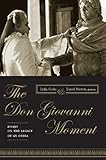The Don Giovanni Moment : Essays on the Legacy of an Opera / ed. by Daniel Herwitz, Lydia Goehr.
Material type: TextSeries: Columbia Themes in Philosophy, Social Criticism, and the ArtsPublisher: New York, NY : Columbia University Press, [2006]Copyright date: ©2006Description: 1 online resource (264 p.) : 14 illusContent type:
TextSeries: Columbia Themes in Philosophy, Social Criticism, and the ArtsPublisher: New York, NY : Columbia University Press, [2006]Copyright date: ©2006Description: 1 online resource (264 p.) : 14 illusContent type: - 9780231137553
- 9780231510646
- ML410.M9 D63 2006
- online - DeGruyter
- Issued also in print.
| Item type | Current library | Call number | URL | Status | Notes | Barcode | |
|---|---|---|---|---|---|---|---|
 eBook
eBook
|
Biblioteca "Angelicum" Pont. Univ. S.Tommaso d'Aquino Nuvola online | online - DeGruyter (Browse shelf(Opens below)) | Online access | Not for loan (Accesso limitato) | Accesso per gli utenti autorizzati / Access for authorized users | (dgr)9780231510646 |
Frontmatter -- Contents -- Contributors -- Introduction -- 1. Don Giovanni: "And what communion hath light with darkness?" -- 2. Don Juan and Faust: On the Interaction Between Two Literary Myths -- 3. "Hidden Secrets of the Self ": E. T. A. Hoffmann's Reading of Don Giovanni -- 4. Don Juan in Nicholas's Russia (Pushkin's The Stone Guest) -- 5. Mörike's Mozart and the Scent of a Woman -- 6. The Gothic Libertine: The Shadow of Don Giovanni in Romantic Music and Culture -- 7. Don Juan as an Idea -- Kierkegaard Writes His Opera -- 9. The Curse and Promise of the Absolutely Musical: Tristan und Isolde and Don Giovanni -- 10. Authority and Judgment in Mozart's Don Giovanni and Wagner's Ring -- 11. Mozart's Don Giovanni in Shaw's Comedy -- 12. Giovanni auf Naxos -- 13. Homage to Adorno's "Homage to Zerlina" -- 14. Adorno and the Don
restricted access online access with authorization star
http://purl.org/coar/access_right/c_16ec
Mozart's Don Giovanni is an operatic masterpiece full of iconic and mythical tensions that still resonate today. The work redefines the terms of power, seduction, and morality, and the resulting conflict between the aesthetic and the ethical is deeply rooted in the Enlightenment and romanticism.The Don Giovanni Moment is the first book to examine the aesthetic and moral legacy of Mozart's opera in the literature, philosophy, and culture of the nineteenth century. The prominent scholars in this collection address the opera's impact on the philosophical visions of Kierkegaard, Goethe, and Williams and its influence on the literary and dramatic works of Pushkin, Hoffmann, Mörike, Byron, Wagner, Strauss, and Shaw. Through a close and careful analysis of Don Giovanni's literary and philosophical reception and its many appropriations, rewritings, and retellings, these contributors treat the opera as a vantage point from which theory and philosophy can reconsider romanticism's central themes. As lively and passionate as the opera itself, these essays continue the spirited debate over the meaning and character of Don Giovanni and its powerful legacy. Together they prove that Mozart's brilliant artistic achievement is as potent and relevant today as when it was first performed two centuries ago.
Issued also in print.
Mode of access: Internet via World Wide Web.
In English.
Description based on online resource; title from PDF title page (publisher's Web site, viewed 02. Mrz 2022)


